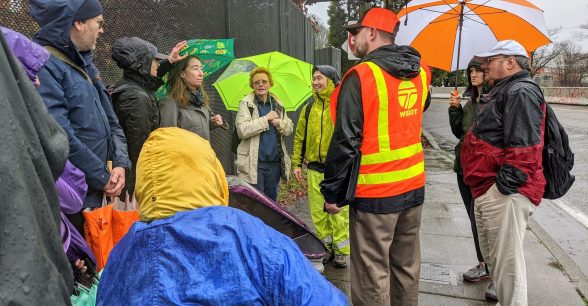In Appalachia, Disability Stigma Has Dangerous Effects
My mother-in-law tried to get Travis (not his real name) on disability. But it was complicated. Not just the process of navigating the bureaucracy around the application—another part of her problem was that being “on disability” in East Tennessee is emotionally fraught territory. There’s an ongoing conversation outside of Appalachia about it: witness this Washington Post series, and the This American Life feature on it. It’s bound up with the idea of “disability fraud” and the “deserving poor.” But for the people involved, it’s also bound up with self-image.
When I knew Travis, he was genial and easygoing. He grew up just down the road from my wife’s family. She used to read to him when they were little, even though he was over ten years older. Travis “didn’t take to books,” as they said. He wound up not doing much with school, as was the norm for someone with intellectual disabilities born in East Tennessee in the 1950s. He often made money doing odd jobs for people, including my father-in-law, who often had him help around the house or out in the field. He also worked part-time at a local riding stable. He couldn’t do a lot of hard work, though, on account of a heart condition he also had.
As that condition worsened, my mother-in-law, a nurse, knew that Travis needed better access to health care and a more stable income. She began to help him navigate the complicated paperwork and doctor’s visits. The problem was, since she wasn’t family, she couldn’t always accompany him. And when the doctors asked him how he was doing, he would inevitably reply, “Oh, fine, fine. Doing fine.” When they asked him if he could work, well, of course he could. And they would deny his claim.
Travis was giving the answers that he knew he had to give. As disabled people, we are trained to not talk about our experiences or problems—except of course when we’re asked by able-bodied people who want to satisfy their curiosity. And for a man in Appalachia to admit that he couldn’t work—well, that was an issue. He wanted the dignity and self-respect that came with claiming he was capable of work. And it cost him.
But what’s the price of dignity? The Washington Post article is specifically framed around a viral incident of shaming: David Hess posted a picture of himself alongside Dale McGlothin, who was holding a sign asking for money. Hess made a counter-sign saying he’d offered a job and had been turned down. And the comments—oh, Lord the comments—lamented the lack of initiative and welfare-addicted nature of the McGlothins. This was borne out by even the local sheriff, who in this article is quoted to remind people to “take that money if you want to give it and give to one of these organizations that you know that the money is going to a good cause and for someone who truly needs it.”
It’s fascinating how these commenters ignore the fact, included in the WaPo article, that McGlothin’s “arms had been damaged” working in a coal mine. Granted, some focused on the son, Tyler, who was following in his father’s stead after Dale’s arrest. But it’s that underlying attitude—the shame, the focus on how a man should be providing for his family—that points to why it is so hard for people like Travis to claim their disability in both an administrative sense and an activist one. They can’t get the services they need, and they can’t identify as disabled in order to band together with others and advocate for the systemic changes that would improve that access in the first place.
Asking for help, admitting that your body is not a strong, intact male body: these are hard things for a man to do, living in a system of toxic masculinity. It’s especially hard in an area where your livelihood often comes from physical work. And now that the federal government is poised to let states allow work requirements for Medicare coverage, this cultural issue has even greater economic and political implications.
The implications are also quite personal. In 2011, inadequate health care led to Travis’s death at age 55.
Right now, the government plans cuts to medical care and services to the disabled, while media outlets across the political spectrum propagate supposed exposés and think pieces about disability fraud. The effect will be to decrease access while increasing shame. For Travis, it meant an early death. With this new round of assaults, unfortunately, Travis’s story is likely to become more widespread. We need to push back not only politically, but culturally—against disability-shaming, poverty-shaming, and toxic masculinity—if we want to move towards a world where everyone has access to a full and rich life.
About Rooted In Rights
Rooted in Rights exists to amplify the perspectives of the disability community. Blog posts and storyteller videos that we publish and content we re-share on social media do not necessarily reflect the opinions or values of Rooted in Rights nor indicate an endorsement of a program or service by Rooted in Rights. We respect and aim to reflect the diversity of opinions and experiences of the disability community. Rooted in Rights seeks to highlight discussions, not direct them. Learn more about Rooted In Rights



